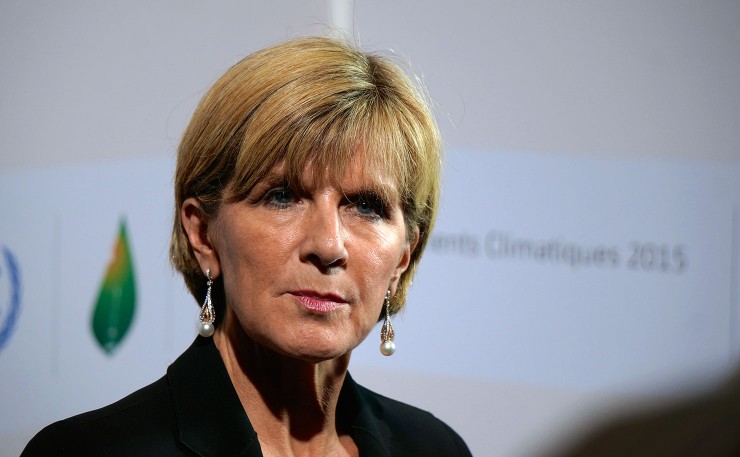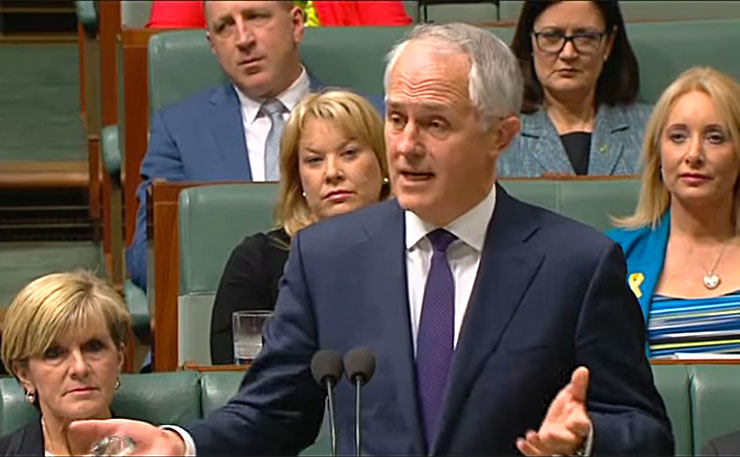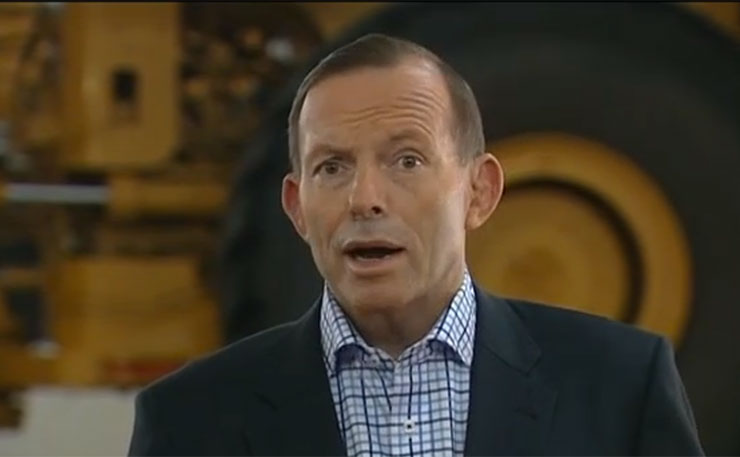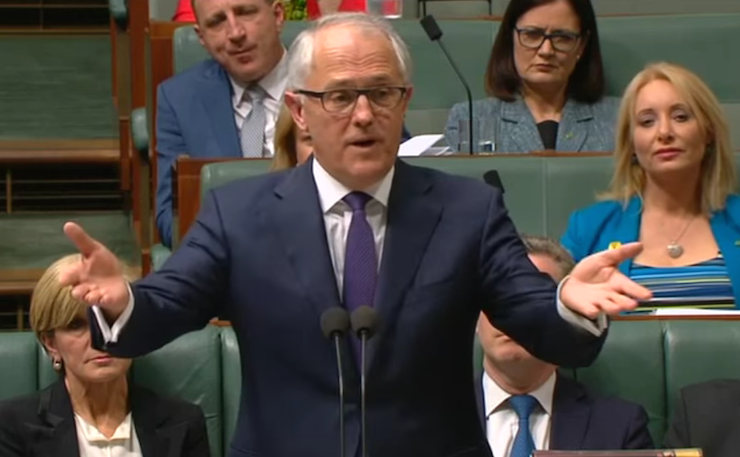The COP21 talks in Paris delivered a compact to lead the world to global catastrophe. Malcolm Turnbull responded with optimism. Dr Lissa Johnson responds with facts.
What do you do as the leader of a nation left behind by a global pro-environmental shift?
At one of the most pivotal climate summits in history, how do you explain the fact that your country has been ranked worst performer among OECD nations in addressing climate change, and third worst overall, with only Kazakhstan and Saudi Arabia beneath you?
This during the second half of the critical decade in which to act, “a decisive point in time,” according to French President Francois Hollande.
As your global peers endorse phasing out fossil fuels in favour of renewables, in order to prevent destruction of the earth’s biosphere, your government persists with the mantra, in slightly different words, that coal is good for humanity. Meanwhile you preside over a renewable energy industry that has been decimated by your government’s policies.
While your geographical neighbours, through no emissions of their own, find themselves steadily submerged by rising seas, you reserve your right to continue to emit, and to subsidise fossil fuels.
You refuse to stop your “Pacific brothers and sisters from drowning”, despite having said yourself that climate change poses a “profound moral challenge”.
How do you spin it?
With optimism.
Australian optimism was among Malcolm Turnbull’s key offerings in his speech at the opening of the COP21 climate talks in Paris, served up again, stale and tasteless, by Julie Bishop at conference end.
(To those of you in Kiribati, stop being gloomy. Think positive.)

In the wake of the Paris climate talks there has been a mixture of cautious optimism and frank realism from environmental groups.
Tim Flannery of the Climate Council described the release of the final text of the Paris agreement as “one of the most important [days]in history” for those interested in climate. His colleague Professor Lesley Hughes, however, cautioned that the pledges in the agreement “are not enough” to avoid dangerous temperature hikes.
Activist and author Naomi Klein went further, noting that the agreement “puts us on a course towards disastrous levels of warming”, adding that “the gap is immense between the rhetoric and the goal of safety, and the reality of the epic danger they are allowing to unfold.”
Given this yawning chasm between rhetoric and reality, as psychological packaging for Australia’s “bullshit” climate policies, optimism is a good bet.
HOUSE AD: NEW MATILDA SURVIVES PRIMARILY ON READER SUBSCRIPTIONS. PLEASE CONSIDER SUPPORTING INDEPENDENT MEDIA BY CLICKING HERE. SUBS START FROM AS LITTLE AS $6 PER MONTH.
It is an easy sell. It almost always gets a good rap. People like it and it feels good.
But there is optimism, and there is optimism.
Optimism is best known for its relationship to positive emotions, motivation, persistence, performance, success, physical health, longevity and psychological wellbeing. Given these benefits, it is difficult to argue with. You risk looking negative if you try.
Less well known, however, is its relationship to self-injurious, destructive and even deadly behaviours.
Many people, for instance, are unrealistically optimistic about their health. This has been known since the 1980s, and has proved a robust psychological finding.
Unrealistic health optimism leads people to view themselves as less likely than others to suffer serious illness and disease, and to underestimate their risks.
When such optimism motivates healthy behaviours, for instance abstinence from smoking, it is obviously a good thing. In this case people make the effort to be healthy with optimism that they will succeed, fostering longevity and health.

However, when paired with unhealthy behaviours, such as smoking, unrealistic optimism can act as a an escapist fantasy, fostering disinterest in risk reduction (‘it won’t happen to me’), with all the negative consequences that this entails, including, potentially, serious illness and death.
Unrealistic optimism regarding heart disease, for instance, is associated with increased atherosclerosis. Conversely, worry about the health consequences of smoking is associated with greater quitting efforts and greater success at quitting.
In other words, when dangers are real and grave, accurate appraisals of risk and consequence help to keep people safe. Wishful optimism can get in the way.
As Australia continues to burn its way towards global food shortages, extreme weather, death, loss of coastline and property, mass displacement and migration, economic loss, and the demise of civilisation as we know it, Malcolm Turnbull would have us trust in “innovation and technology” to deliver us from catastrophe.
This is the societal equivalent of a smoker with lung disease praying for a genetic engineering breakthrough before their lungs give out, while continuing to smoke.
Such unrealistic optimism is recognised in the psychological literature as a positive illusion, among other positive illusions, including illusions of control, to which Turnbull’s rosy rhetoric also appeals.
Turnbull advises “great optimism and faith in humanity’s genius” to control global warming in the future, rather than prevent it now.
This particular brand of faith is a form of “unrealistic technology optimism” according to Norwegian experts in climate, energy and process engineering. In a paper on the subject, researchers at The Norwegian University of Science and Technology argue that unrealistic technology optimism is a significant obstacle to genuine climate change mitigation, and that it pervades existing climate models and policies.
In other fields, unrealistic optimism has been similarly posited to influence a range of destructive social policies and endeavours, including war. In their paper ‘The costs and benefits of positive illusions’ Researchers in Decision Sciences and Economics note, “The Iraq war was declared based on (a) optimistic assessments of an easy victory, (b) that Iraqis would consider the US and allied troops as “liberators” and (c) on the false belief that Iraqi dictator Saddam Hussein’s government held weapons of mass destruction… The reality proved quite different”.
The authors make similar arguments with respect to Afghanistan and Vietnam, concluding that “The illusion of underestimating the real factors surrounding a war and the optimistic assessment that the situation can be controlled involves an immense cost and no benefits, at least in the three wars covered”.
One means by which unrealistic optimism fosters reckless behaviour is through disengagement from facts, particularly those pertaining to negative consequences.
Indeed, Malcolm Turnbull has shown irritation on occasion, if not contempt, towards those seeking to place facts in the way of his wishful thinking.

He gave the Vice Chancellor of Melbourne University, for instance, a distinct dressing down over his realism on the subject of corporate funding for higher education in Australia.
Turnbull said, “Well that is, if I may say, not very optimistic, and optimism is the new fashion… your students are optimistic and you should be too if you want them to respect you.”
Take that.
Like climate change, corporate funding of Universities is a Coalition policy area better served by optimism than by fact. Were voters to scrutinise factual detail they might discover that the Koch brothers, famous for funding climate denial science, also spend millions on higher education in the US.
An investigation by the Centre for Public Integrity, winner of the 2014 Pulitzer Prize, found that “The Koch brothers use donations and key connections to amass clout on college campuses. The money often helps forward their political goals and to build a “talent pipeline” of libertarian-minded students”.
The spectre of corporate-funded neoliberal biases in education is relevant not only to education but also to climate. In a recent interview, one of the world’s leading climate scientists, Kevin Anderson, said that climate scientists are self-censoring and understating the severity of the climate crisis for political and economic reasons.
He explains, “What we are afraid of doing is putting forward analysis that questions the sort of economic paradigm, the economic way that we run society today. So, we… don’t question that…. What we do is we fine-tune our analysis so it fits within… the political and economic framing of society, the current political and economic framing. So we don’t really say that — actually, our science now asks fundamental questions about this idea of economic growth in the short term, and we’re very reluctant to say that.
“In fact, the funding bodies often are reluctant to fund research that raises those questions. So the whole setup, not just the scientists, the research community around it that funds the research, the journalists, events like this [COP21], we’re all deliberately being slightly sort of self-delusional.
“We all know the situation is much more severe than we’re prepared to voice openly. We all know this. So… this is a collective sort of façade, a mask that we have.”
Naomi Klein made similar points in her speech following the conclusion of the Paris climate talks, noting that while leaders said “many of the right things over the last two weeks in beautiful speeches… despite their words, they remain trapped in a broken system.”
Responding to such sobering realities is unnecessary, however, for anyone who buys Turnbull’s optimism. We can go comfortably back to underestimating risk, ignoring fact and pressing ahead with life as we know it, broken system and all.
Despite the stylistic differences, this determination to steer voters away from fact and evidence unites Turnbull and Abbott.

While Abbott opted to slap down evidence in his impulsive and combative way, Turnbull seeks instead to turn our heads with soaring, optimistic language (aided by the occasional slap-down for the brave soul who dares challenge him with a fact).
Unlike Abbott, however, Turnbull is clearly a man with the capacity to process a complicated reality. He is at home with complexity and nuance. He can handle the intricacies of the climate debate.
He understands that science is real. He even knows that his own policies are “bullshit”.
How does he reconcile this, then, with his current climate stance?
How can he live with himself?
One explanation is that winning is simply more important to him.
Winning the leadership. Winning funding and donations from mining and energy. Winning profits for his party’s backers.
And winning the election.
Not only will allegiance to big polluters assist him to win elections, so will optimism. Optimism, as it turns out, contributes to electoral success. In the United States, the more optimistic presidential candidate has won the presidency in 18 of 22 elections studied over 84 years.
In terms of the psychology of ideology, this winning-focussed explanation is consistent with a Social Dominance Orientation to policy and climate change (a ruthless, dog-eat-dog, win-at-all-costs motive), as I discussed in relation to the Abbott leadership here.
Then again, Turnbull may still have a long range plan. Perhaps he knows something that we don’t, and intends to bring his party to their senses in time.
President Anote Tong of Kiribati certainly hopes so. The survival of his nation depends upon it.
Except that Paris was the opportunity for Governments to present their long range plans. That was the point.
How long should the Australian population wait, in hope and optimism, that our new Prime Minster isn’t as reckless as his policies suggest?
Can we afford to take that risk?
What kind of optimism is warranted at a time like this?
In the wake of the Paris talks, constructive and realistic optimism might involve hope that more pro-environmental global rhetoric will encourage greater grassroots public pressure and activism around the world. In this context, the Australian public’s level of awareness might be raised.
More Australian people might come to realise how out-of-step with reality their Government is, and how pressing it is that the Government change.
The nearly half of Australians surveyed who believe that climate change is not human-induced, and who are subsequently vulnerable to Turnbull’s dangerous optimism, might start coming to their senses, even if their Government doesn’t.
Or perhaps this is wishful thinking.
Even so, it is optimism that at least motivates action of the constructive, planet-saving kind: lobbying, activism, advocacy, information and education.
Which is all we’ve got.
Optimism and pessimism aside, time is running out.
That, unfortunately, is an undisputed fact.
HOUSE AD: NEW MATILDA SURVIVES PRIMARILY ON READER SUBSCRIPTIONS. PLEASE CONSIDER SUPPORTING INDEPENDENT MEDIA BY CLICKING HERE. SUBS START FROM AS LITTLE AS $6 PER MONTH.
Donate To New Matilda
New Matilda is a small, independent media outlet. We survive through reader contributions, and never losing a lawsuit. If you got something from this article, giving something back helps us to continue speaking truth to power. Every little bit counts.





